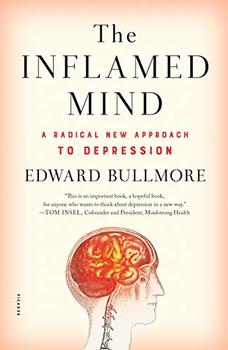Summary | Excerpt | Reviews | Beyond the Book | Readalikes | Genres & Themes | Author Bio

A Radical New Approach to Depression
by Edward Bullmore
Working out this mechanistic chain of cause and effect, which leads from a physical attack, like an injury or an infection, to an inflammatory response from the immune system, is one of the truly game-changing triumphs of scientific medicine. This is the triumph of immunology, the science that now permeates our understanding of almost all diseases, and underpins the therapeutic success of vaccination, transplant surgery and successful new drugs for diseases like rheumatoid arthritis, multiple sclerosis and increasingly more kinds of cancer. This immensely powerful science can provide a minutely detailed explanation for how infection in my tooth could cause local inflammation of my gums, and how surgery could exacerbate the inflammation acutely.
But immunology has not yet had nearly so much to say about what inflammation feels like for the inflamed patient, or how inflammation can have effects on thoughts and behaviour. Why did I want to be by myself? Why did I want to go to bed and stay there? Why was I so gloomy? The answers to questions like these have traditionally come from psychology, rather than immunology.
Thus I told myself a psychological story, that my close encounter with the dentist must have reminded me that I was literally getting long in the tooth. And this concrete affirmation of a well-worn metaphor for mortality must have triggered a period of rational pessimism as I calculated how much longer I might have to live. To paraphrase my self-diagnosis, to put it another way: I became momentarily depressed because I thought about the implications of my root canal surgery. My mental state was a reflection or meditation on my physical state, rather than directly caused by my physical state.
To the extent that you are still unsurprised by this story, you are a dualist. Because the conventional medical explanation for what happened to me is dualist – it exists in two domains – physical and mental – with only a nebulous point of connection between them. Everything that happened up to and including my visit to the dentist is precisely explained in the physical domain, by the biological science of infection and immunity. Everything that happened to my mood and behaviour after I went to the dentist is explained in the mental domain, by the psychologically meaningful story I told myself about getting long in the tooth.
At the time, about 2013, when I explained my own experience of inflammation and depression in this way, I found it somewhat comforting “to know”. Now, looking back, I am finally surprised. I am surprised to realise how incomplete and convoluted the standard dualist explanation seems to be – now that I know there could be a very different kind of explanation for what happened to me. There is another way of thinking about my root canal blues. I could have been momentarily depressed simply because I was inflamed; not because I thought about the consequences of being inflamed. The brief, transient burst of inflammation in my mouth could directly have caused the changes in my mood, behaviour and cognition that I noticed immediately after the surgery.
This new explanation is logically simpler than the familiar dualist reasoning I used when I told myself the story about getting long in the tooth. The stream of explanatory narrative doesn’t run into the sand in the physical domain, when I get out of the dentist’s chair, and then miraculously resurface in the mental domain, when I am back at home despondently in bed. Now the chain of cause and effect can run from start to finish in the physical domain – from the initial cause of an infected tooth to the final effect of a depressed mood.
But causality is tough to nail down, scientifically. To be completely confident that inflammation can cause depression we’d want to know the answers to two big questions:
How, exactly, step by step, can inflammatory changes in the body’s immune system cause changes in the way the brain works so as to make people feel depressed?
Excerpted from The Inflamed Mind by Edward Bullmore. Copyright © 2018 by Edward Bullmore. Excerpted by permission of Picador. All rights reserved. No part of this excerpt may be reproduced or reprinted without permission in writing from the publisher.
Your guide toexceptional books
BookBrowse seeks out and recommends the best in contemporary fiction and nonfiction—books that not only engage and entertain but also deepen our understanding of ourselves and the world around us.